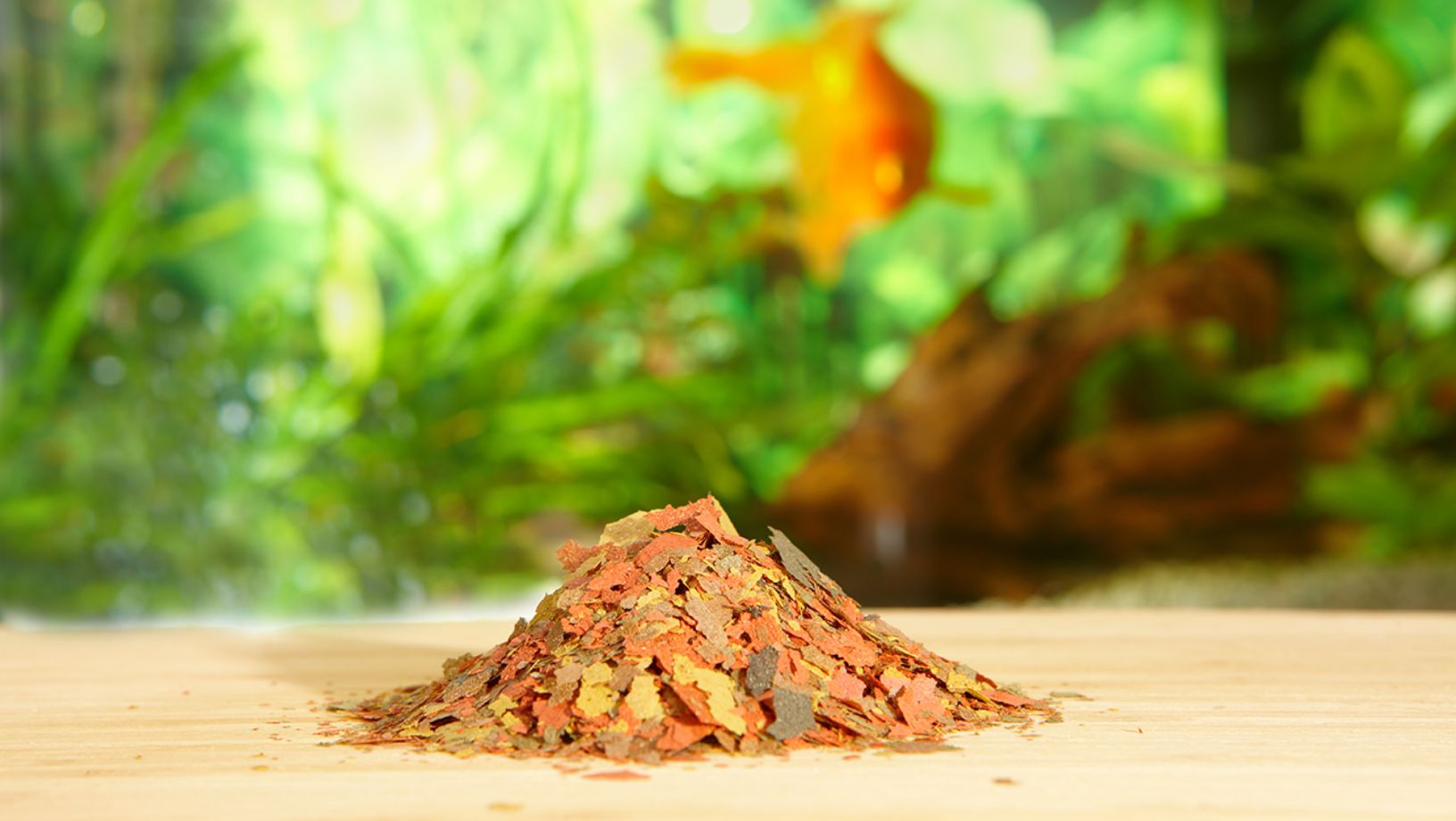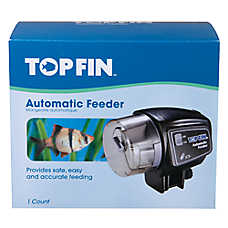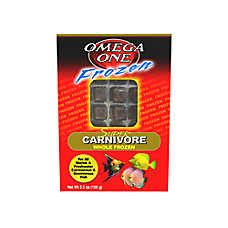What Do Fish Eat and What Should I Buy?

In this Article
If you are someone who currently cares for or is planning to bring home an aquarium, then you may be asking, “What do fish eat?” With hundreds of different kinds of fish out there to love, this is a really great question. You see, not every fish eats the same food. What food pet parents ultimately choose needs to fit the need of that species of fish.
Most are familiar with goldfish and the fact that they can eat fish flakes. So, what makes others so different? Fish come from all over the world and have adapted to feed on the available food types found in the unique ecosystem that they are from. Where your fish is from can play a huge role in determining what they can eat. For a clear direction toward what fish food is specifically right for your aquatic friend, you should consult with a PetSmart associate who can tell you more about your fish and what might be the best diet for them.
Most are familiar with goldfish and the fact that they can eat fish flakes. So, what makes others so different? Fish come from all over the world and have adapted to feed on the available food types found in the unique ecosystem that they are from. Where your fish is from can play a huge role in determining what they can eat. For a clear direction toward what fish food is specifically right for your aquatic friend, you should consult with a PetSmart associate who can tell you more about your fish and what might be the best diet for them.
What Do Fish Eat?
There are many different kinds of fish food on the market for a variety of dietary needs. Regardless of the type of fish you have, they will likely eat in at least one of these categories:
Dried Fish Foods
Dried fish foods are the most common type for aquatic animals in the home. You might be most familiar with some of these options, as they are often given to the most common household fish. Dry foods include:
Flakes - Flake food floats at the top of the tank, readily available for any swimming friends who prefer to eat that way. There are even specific kinds of dried flakes designed for certain types of fish like goldfish.
Pellets - Pellet food is often used for larger aquarium fish and comes in floating and sinking varieties (for those fish who prefer not to eat floating pellets at the surface). Most fish food manufacturers say to only feed what the fish can eat in a certain amount of time (usually 2-3 minutes). Uneaten food should be removed as the pellets decompose, which can lead to poor water quality in the aquarium.
Freeze-dried - Freeze-dried fish food is typically something that was once alive (shrimp, worms, etc.) that has been freeze-dried. This is typically given to fish with a higher protein diet and, while freeze-dried food is convenient, it doesn’t offer as much protein as fresh or frozen food.
Live Fish Foods
Live fish food can come in many varieties but are more difficult to obtain, with the exception of live feeder fish and ghost shrimp which are found at all PetSmart locations that sell fish. There are some species of fish that will feed on almost nothing but live fish like freshwater gars, but most types of predatory fish can be adapted to eat dried or frozen foods which is much healthier for them. Because live fish can introduce parasites and other diseases to the fish that they are feeding, it is a good idea to have a separate aquarium set up where the feeder fish can be placed and observed for 1-2 weeks to ensure that they are healthy before feeding them to your fish.
Frozen Fish Foods – Most frozen foods are fish, shrimp or other crustaceans. Frozen foods are typically more nutritious than live food, and their quality more consistent. Many people choose it for that reason and the convenience of not having to go to the pet store every week.
Frozen Live Food - Many of the classic live foods can be found in the freezer section. These can be a higher quality option and last longer than regular live food does.
The Importance of Feeding Your Aquarium Fish The Right Kind of Food:
With there being so many different types of fish, each kind has their very own set of nutritional needs. It is very important to make sure you are feeding your fish the right type and amount of fish food so that they get everything they need to stay healthy. Fish diets can be broken down into three different categories; herbivore, carnivore, and omnivore. What category you fish falls into matters greatly when figuring out what you should feed your fish.
Different Types of Fish Diets:
Herbivore
Herbivores are animals that are purely vegetarian. Very few fish fall into this category but the ones that do need to stick to a plant-based diet because it is what they are capable of digesting.
Common herbivore fish include:
- Most Plecostomus species
- Some African Cichlids
What Do Fish Eat if They are Herbivores?
These kinds of fish do really well on a staple diet of flake food, but also enjoy feeding on algae wafers. Fresh food options also work and pet parents can feed their fish vegetables and fruits that are approved for feeding their fish.
Omnivore
Most fish will fall into the omnivore category when it comes to their diet. This means that they should eat both meat and plants. This offers a lot of flexibility in what you end up feeding your aquatic friend and allows them to find their nutrition in a variety of different foods.
Common omnivorous fish include:
- Goldfish
- Mollies
- Platies
- Guppies
- Barbs
- Most Catfish
- Cory Catfish
- And More
What Do Fish Eat if They are Omnivores?
There are a lot of recommendations when it comes to what you can feed your omnivore fish. There are frozen foods, live foods, fresh foods, and dried foods available for their consumption. Most flake and pelleted foods are made of both animal protein and vegetable matter, so they are ideal as a staple food for most omnivorous fish. Some fish have food made specifically for them, so read the label closely to make sure you are getting the right one for yours.
Carnivore
Carnivorous fish are ones that eat almost entirely meat. Most kinds of fish that are kept as pets are not carnivorous, but there are a few species that people do commonly keep as pets that are. Carnivores require a lot of protein to stay healthy, but that doesn’t mean that they must eat live food. (For health reasons, most aquatics experts do not encourage feeding live fish unless your fish won’t eat anything else.) In most cases, frozen fish food will provide a more nutritious meal for these types of fish.
Common carnivore fish include:
- Some south and Central American Cichlids like Oscars
- Bettas
- Angelfish
- Clown loaches
- Freshwater eels
- And More
What Do Fish Eat if They are Carnivores?
There are a lot of flake, pelleted, frozen and freeze-dried fish food options that carnivorous fish can eat to stay strong and healthy. For example, smaller carnivorous fish like angelfish and betta fish will prefer smaller high protein pelleted food, flake food, and small frozen or freeze-dried food like blood worms or brine shrimp. Larger carnivorous fish like Oscars or red devils would prefer larger pelleted foods or larger frozen foods like silversides or krill.
How Often Should You Feed Your Fish?
Because every fish is so different, there may be different rules for how often a fish needs to eat. Larger fish might need to eat more often than smaller fish, but even some small breeds need more frequent feedings. The best way to find out how often you should feed your fish is to ask a PetSmart associate. An important thing to remember is that overfeeding your fish can cause poor water quality that can lead to unhealthy consequences.
The Challenge of Overfeeding Your Fish
It can be hard to tell when a fish is hungry. They are not vocal about their needs like cats and dogs are. Sometimes, fish might seem like they are hungry when they are not. This can lead to dangerous overfeeding that can cause a fish a lot of harm in the long run.
For common species like goldfish, 2-3 times a day might be plenty. Ultimately, it will vary depending on the type of fish in your tank.
So, What Do Fish Eat and What Should I Feed My Fish?
Hopefully, after reading this, you have a better understanding of what to look for and how to determine what your aquatic friend needs nutritionally to stay healthy. Every fish is different. It is important that you do plenty of research and talk to an expert before bringing any fish home. With the right planning and preparation, your fish can live their very best life!
Need other fish supplies while you’re shopping for fish food? PetSmart also carries tanks & aquariums, starter kits for fish, and water quality tests, as well as a variety of live fish such as goldfish, betta fish and koi and pond fish.
PetSmart offers convenient shopping with Curbside Pickup or in-store pickup. Need something today? We have select items available for Same-Day Delivery in most areas powered by DoorDash. For items you purchase frequently, PetSmart has Autoship that automatically delivers the items you want to your door as often as you’d like. Check the website to see which items are eligible.
Information in this article is not intended to diagnose, treat or cure your pet and is not a substitute for veterinary care provided by a licensed veterinarian. For any medical or health-related advice concerning the care and treatment of your pet, contact your veterinarian.


